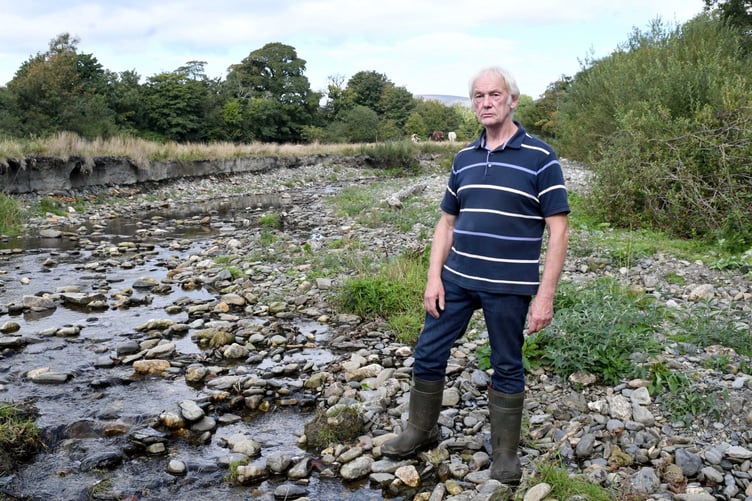Farmer and landowner Alf Caine has warned that the River Glass is in danger of flooding after, he claims, years of neglect by the Department of Infrastructure.
Mr Caine has owned Castleward Farm for over 30 years and says he has been talking with the government about debris in the river, that runs through his land, since 2009.
After reaching out to the department about clearing the logs and foliage that end up in the river, Mr Caine has been told that this is his responsibility as a ‘riparian landowner’, or someone who owns property adjoining a river.
This is something that he says goes against the Flood Risk Management Act 2013.
He said: ‘The DoI is basically abusing the act, it’s not complying with the spirit of the law and it has looked for a loophole so it doesn’t have to do anything. It has taken advantage of the may opt out clause which is in there.’
As his land is upstream from the Tromode area, where significant flooding caused by blockages in 2015 saw considerable damage to vehicles and property in the area, Mr Caine says he is concerned that this could happen again if nothing is done.
‘Most of our problems are trees coming down the river, the vegetation and debris is coming downstream and doesn’t originate in Castleward but we’re trying to save our neighbours from any potential danger by removing them,’ he said.
The farmer explained that as his land is primarily used for livestock grazing, he does not personally experience many problems during flooding but is worried about what could happen downstream.
While workers have been sent to Mr Caine’s property to partially clean the river on two occasions, he says ‘they were limited in what they could do, and that was the limitations by their superiors rather than complying with the act’.
He said: ‘We need a government which is going to act to prevent disasters and problems and the sooner, the better.’
Current law also prevents riparian landowners from carrying out works that ‘may significantly affect the flow of a watercourse’ without seeking consent from the DoI.
Those who ‘wilfully or unlawfully interfere with a designated watercourse or FRM works’ may be liable to charges amounting up to two years imprisonment or a £5,000 fine.
Mr Caine claims this has put him and other farmers off trying to sort out major problem in rivers on their land for fear of facing criminal charges against them.
The Isle of Man Flood Hub, which takes in reports of flooding from the public and provides information on watercourse maintenance, brought together staff from Manx Utilities, the DoI and the Met Office under a ‘flood management division’ in 2020.
Guidance found on its website says that the aim behind requiring permission from the department for works in, over or under a watercourse or flood defence is to prevent the endangering of life or property by increasing the risk of flooding or causing harm to the environment
Alongside his concerns about the impact on the local population, as his land is along the road from the Tromode industrial estate, Mr Caine says he believes the businesses there could be especially affected after flooding in 2015 apparently cost an excess of £100,000.
A statement provided by the landowner, which he attributes to Clucas Plc who own and operate the estate, said: ‘Over the last nine years Clucas Plc has invested over £ 4 million creating 14 new units.
‘The investment decision was heavily based on riverbed surveys of the River Glass and flood risk assessment reports based on fluvial flooding with a range of risk between a 1 in 100 chance and a one in 1,000 chance of fluvial happening in any one year.
‘Any deterioration of this risk due to neglect in maintaining the river, the riverbanks or the bridges would undoubtedly adversely affect any future investment by the company.’
An independent report commissioned after the severe flooding in Laxey in 2019 included an improvement of the management of blockage and debris in ‘high- risk catchments’ as part of its 10 recommendations.
At the time, then chief minister Howard Quayle said that each of the reports recommendations would be ‘implemented in full’.

.jpeg?width=209&height=140&crop=209:145,smart&quality=75)
.jpeg?width=209&height=140&crop=209:145,smart&quality=75)

.jpeg?width=209&height=140&crop=209:145,smart&quality=75)
Comments
This article has no comments yet. Be the first to leave a comment.